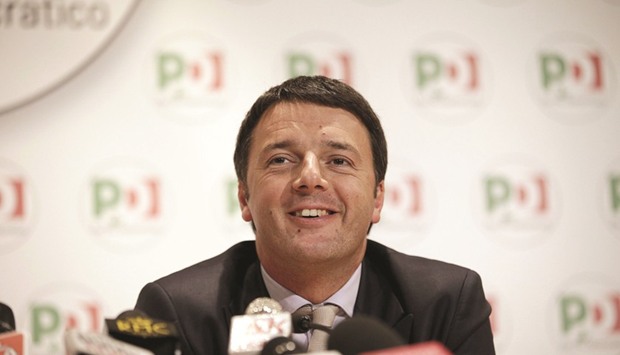Former prime minister Matteo Renzi was poised to win the leadership of Italy’s ruling Democratic Party (PD) in a primary election yesterday, propelling him back to the forefront of the national political scene.
Renzi, 42, resigned as prime minister in December after Italians overwhelmingly rejected a constitutional referendum aimed at streamlining Italy’s parliamentary system.
In the aftermath of the vote defeat and facing a rebellion from the left wing of his centre-left party, Renzi stepped down as party leader in February with the aim of regaining legitimacy in a future vote.
Yesterday he was up against two candidates considered further to the left: Justice Minister Andrea Orlando and Michele Emiliano, who heads the southern Puglia region.
As of noon yesterday, about 700,000 people had voted in the primary, more than many analysts had expected but fewer than the 900,000 who had voted by this time in the party’s previous primary contest in 2013.
The roughly 10,000 polling stations – mainly stands in the streets, but also in cultural centres and bars –closed at 8pm (1800 GMT), and final results were expected later in the evening.
“It’s a festival of democracy,” Renzi told reporters after casting his vote.
“I hope that others will do the same, it doesn’t hurt,” Renzi added, taking a swipe at the rival Five-Star Movement (M5S), which is running close to the PD in opinion polls but which decided to hold its primary contest via an online vote.
An internal vote conducted by the PD this month suggested a clear Renzi victory after he scored 66.7%, with 25.3% for Orlando and 8% for Emiliano.
When he first took over the leadership in December 2013, Renzi won the backing of close on 68% of 2.8mn voters.
Similar figures would underpin the winner’s legitimacy – but Emiliano said the election would be a flop if fewer people voted this time, while Orlando said that fewer than 2mn cast ballots would signal a failure.
Renzi set the bar much lower – at 1mn.
The vote was open to all Italians over 16 years old, EU citizens residing in Italy and non-EU foreigners with valid residency permits – on condition of paying a donation of at least €2.
Lorenzo De Sio, a professor of political sociology at the Luiss University in Rome, said the turnout would be crucial in determining Renzi’s legitimacy.
“Rather than a competition, we’re looking at a process of legitimisation, a sort of crowning of Renzi as leader of the PD. We can expect a huge Renzi victory but with weak voter turnout. People on the left do not seem to be mobilised,” he said.
“If participation rates are around 1mn people or less, Renzi’s legitimisation won’t be strong; if it is between 1.5mn and 2mn, he will wind up in a stronger position,” De Sio said.
The winner of the vote will lead the party during legislative elections slated for spring 2018, unless parliamentarians come to an agreement on electoral reforms before then and call for early elections.

Renzi: It’s a festival of democracy.
